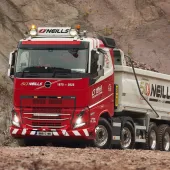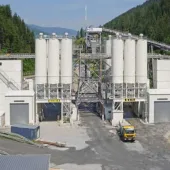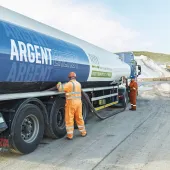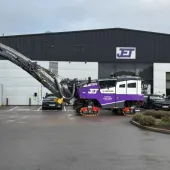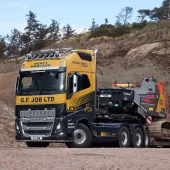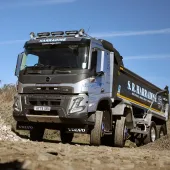Truck Fleet Renewal

First published in the January 2021 issue of Quarry Management
Procuring a significant number of commercial vehicles and getting those vehicles operational in a large fleet is a complex matter. Here, building materials suppliers Marshalls and contract hire specialists Ryder outline some of the key aspects of a 100-tractor unit deal
Marshalls are the UK’s leading manufacturers of hard landscaping products and have been supplying superior natural stone and innovative concrete products to the construction, home improvement and landscape markets since the 1890s.
The company has 20 operating centres throughout the UK, including quarries and manufacturing plants that make concrete products for buildings and landscaping. In addition to its manufacturing operations, the company runs a significant nationwide distribution system to deliver its products to builders’ merchants and other customers, including landscaping businesses and construction companies.
At the heart of Marshalls’ operations is the company’s three-day delivery promise. All of its activities are designed and aligned to deliver on this promise, which is supported by a large and complex transport operation involving more than 350 trucks and trailers.
In 2019, Marshalls were ready to replace around a third of their vehicle fleet and issued a formal tender to test the market. The company assessed a range of bidders and Ryder were ultimately selected to provide the new vehicles.
Marshalls’ relationship with Ryder began in 2008. An initial supply of eight vehicles followed in 2011, and since then Marshalls have been sourcing an increasing proportion of their vehicle fleet from Ryder. The partnership has developed with significant commitment from both parties.
The new order for 100 DAF XF480 tractor units with Space cabs has taken Ryder’s share to more than 240 vehicles and trailers – around two-thirds of Marshalls’ fleet. Inevitably, a key focus of procurement on this scale is risk management. This covers not only the financial scale of the deal and the need to choose a reliable partner, but also the requirement to maintain a consistent and reliable approach in supporting a complex transport operation while on-boarding a large number of new vehicles.
Jonathan Galvin, category manager in Marshalls’ procurement department, commented: ‘In ultimately selecting Ryder to provide such a large proportion of our transport fleet, we know that Ryder are a long-standing and stable business. We also value highly the fact that Ryder use their own funds and has the financial backing of a major US corporation. Ryder have more than 20,000 vehicles themselves, so we also benefited from their buying power in the market to secure the financial terms that meet our business needs.’
John Robinson, Ryder’s director of fleet sales, has been involved in the Marshalls relationship since 2008. ‘We’ve worked really hard to understand the demands of Marshalls’ transport operation, which is complex and involves a large number and wide range of vehicle types. I think our size and strength as a business give us a real advantage in supporting a transport operation as large and diverse as Marshalls,’ he said.
‘This latest order takes our fleet to more than 100 tractor units with Marshalls, plus a further 90 drawbar prime movers, drawbar trailers and semi-trailers. In addition, we are supplying Marshalls with a fleet of more than 40 roll loader cranes, and a small fleet of tipper trucks that are used in their quarrying operations.’
Ryder’s sales and engineering teams have always worked closely with Marshalls and the OEMs to specify exactly the right vehicle types and configurations. Over the years, Marshalls have been provided with a range of equipment and marques, including DAF and Mercedes-Benz, and a range of trailer types. Ryder’s multi-marque capability is valued by customers but, in the case of the latest vehicles, Marshalls selected DAF XF tractors.
Mr Galvin commented: ‘We have used a variety of vehicle marques over the years, but DAF is particularly well liked. The vehicles are robust, reliable and the fuel efficiency is competitive.
‘Driver acceptance is also very important. We have an excellent team of highly trained drivers, and it is business critical that we retain them in the face of driver shortages in the industry. We worked closely with our Drivers’ Forum on the final specification of the new vehicles to ensure we captured their input.
‘The new DAF vehicles are of an extremely high specification. Our drivers spend a lot of time in the cab, sometimes up to eight or nine hours when they are trunking, and for several days and nights when tramping. Their safety and comfort are key. It’s important that drivers can stand up in the cab and are not cramped. All of the latest tractor units have fridges and microwaves.’
The focus on specification was not limited to the cab interiors, as David Grogut, asset engineering manager at Ryder, explained: ‘Our engineers focused on another important area, due diligence, to ensure that all new equipment going into the fleet would be compatible with the existing fleet. For example, reviewing the specification of the tractor units against the types of trailers they are being matched with. In addition to dropside trailers with Hiab roll loader cranes, Marshalls use a fleet of tipping trailers for transporting aggregates.
‘Where ancillary equipment is being fitted, for example cameras that are a dealer fit item, we review all relevant type approval documents to ensure that compliance and best practice is maintained. In the case of the camera supplier for the latest DAF tractor units, we ensured the cameras were fitted in the best location to avoid damage and wear and tear, and also designed bespoke brackets and shielding to avoid AdBlue being spilled on cameras during refilling,’ said Mr Grogut.
Vehicle uptime is key to maintaining the Marshalls’ delivery promise. Mr Robinson commented: ‘Marshalls run a demanding fleet operation through Scotland, England and Wales. Their trunking fleet is based on a five-day operation with some vehicles away from the home location on tramping runs for six straight days and nights. Ryder’s approach to supporting the operation is two-pronged. First, Marshalls can take advantage of Ryder’s significant rental fleet, especially during the summer peak demand months, but also for breakdown cover. Secondly, we have a dedicated Ryder account management function to support Marshalls on a day-to-day basis.’
That account management is led by Siân Caldecourt, who is based at Ryder’s Birmingham head office. She has many years of truck and trailer maintenance experience and is Marshalls’ key contact at Ryder. Liaising with the transport managers in Marshalls’ locations, Ms Caldecourt has full visibility of Marshalls’ daily operations and ensures the right support is provided, so that the fleet operation runs smoothly and efficiently.
The contract with Ryder covers full maintenance and compliance supported by Ryder’s FleetCare maintenance network, together with mobile maintenance for trailers. According to Ms Caldecourt, flexibility is key.
‘Marshalls needs their vehicles on the road doing their jobs, so it is critical that plans are in place for when vehicles are off the road for servicing and maintenance, or in the event of a breakdown,’ she said. ‘At the same time, being honest is key to building and maintaining trust so, if things do occasionally not happen as smoothly as we would like, Marshalls know that we are being straight with them and that we’re doing our very best to rectify matters.’
A range of critical KPIs is used to monitor compliance performance in order to improve efficiency and drive continuous improvement. These are reported to the Marshalls team on a monthly basis.
A key focus for Ms Caldecourt has been the successful introduction of the 100 new DAF tractors. Introducing such a large number of new vehicles into a busy transport fleet is a complex operation, but Ryder have been able to draw on their rental fleet, deploying around 45 tractor units to keep the Marshalls transport operation running [as older vehicles are de-fleeted before the new vehicles are delivered].
The first new vehicles joined the Marshalls fleet in late 2019, with around five vehicles being introduced into the fleet each week thereafter.
‘It is a fantastic achievement to now be a major supplier of commercial vehicles to Marshalls, and testimony to the progressive working relationships that have developed at many levels throughout both our organizations over the last 10 years,’ concluded Mr Robinson.
From ethical products to ethical transport
As ethical manufacturers and suppliers of natural stone and concrete products, accredited to ISO 14001 and ISO 5001, sustainability is a key corporate priority for Marshalls.
David Grogut, asset engineering manager at Ryder, commented: ‘Maximizing fuel efficiency and reducing CO2 emissions are key priorities for Marshalls. The vehicles tend to carry very heavy loads so, in addition to ensuring the correct powertrain and differential ratios are specified, we also looked at all options for reducing vehicle weight.’
Naturally, all the new vehicles are Euro-6, which while well-established in transport as a whole, is new to Marshalls.
A ‘train the trainer’ programme run by DAF and Ryder focused on how to get the best out of the new technology. This covered issues such as maximizing the use of cruise control for improved fuel efficiency and reduced CO2 emissions. ‘The training was rolled out across Marshalls’ driver team and has been really well received, giving them a head start on how to operate their new vehicles in the most efficient and effective way,’ added Ryder contract manager Siân Caldecourt.
- Subscribe to Quarry Management, the monthly journal for the mineral products industry, to read articles before they appear on Agg-Net.com


